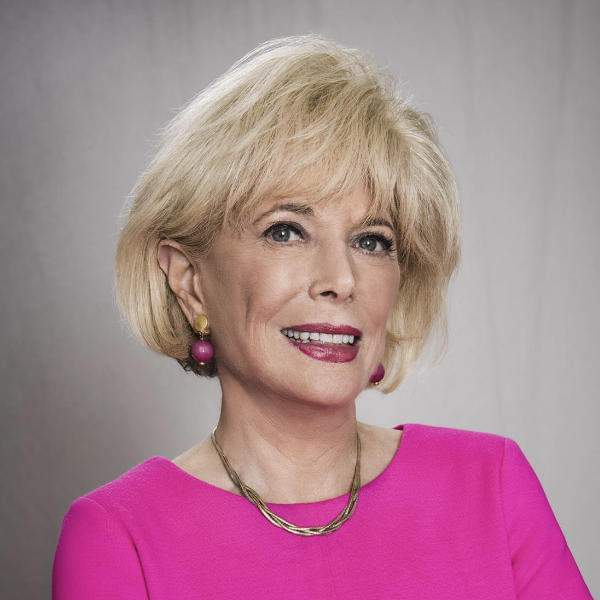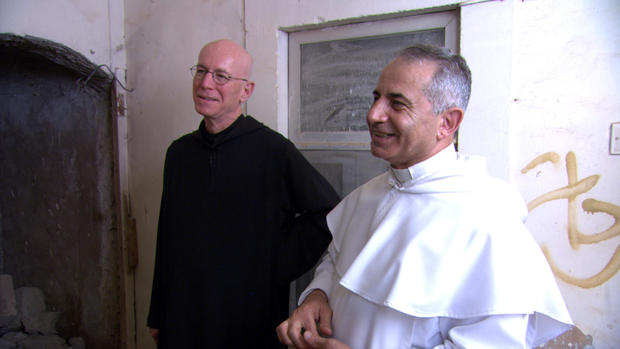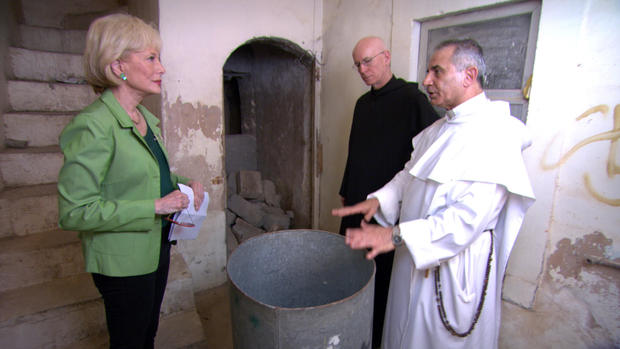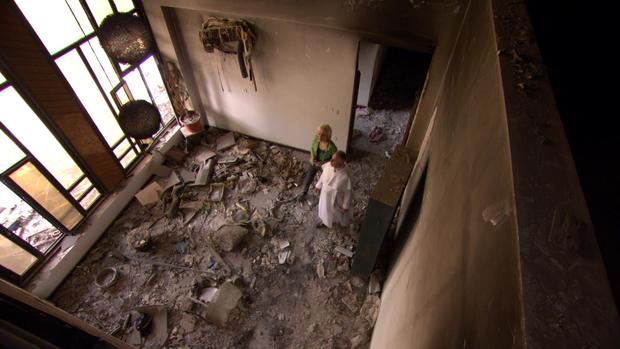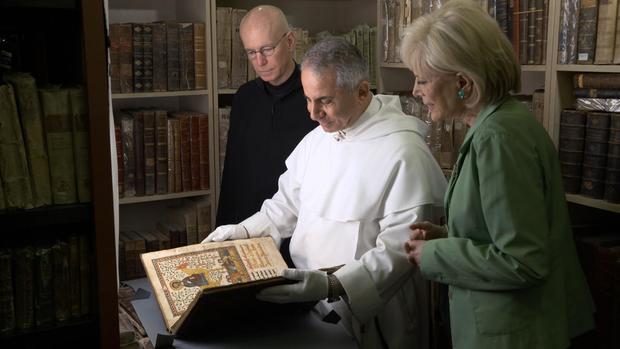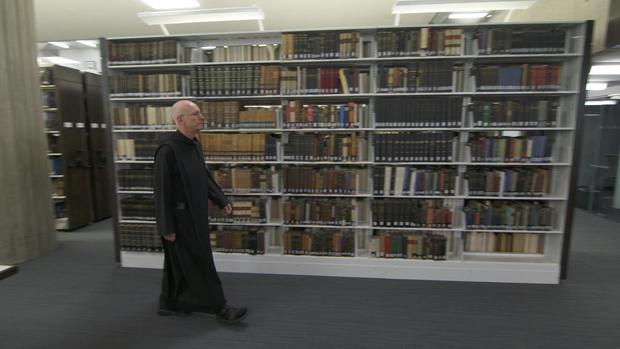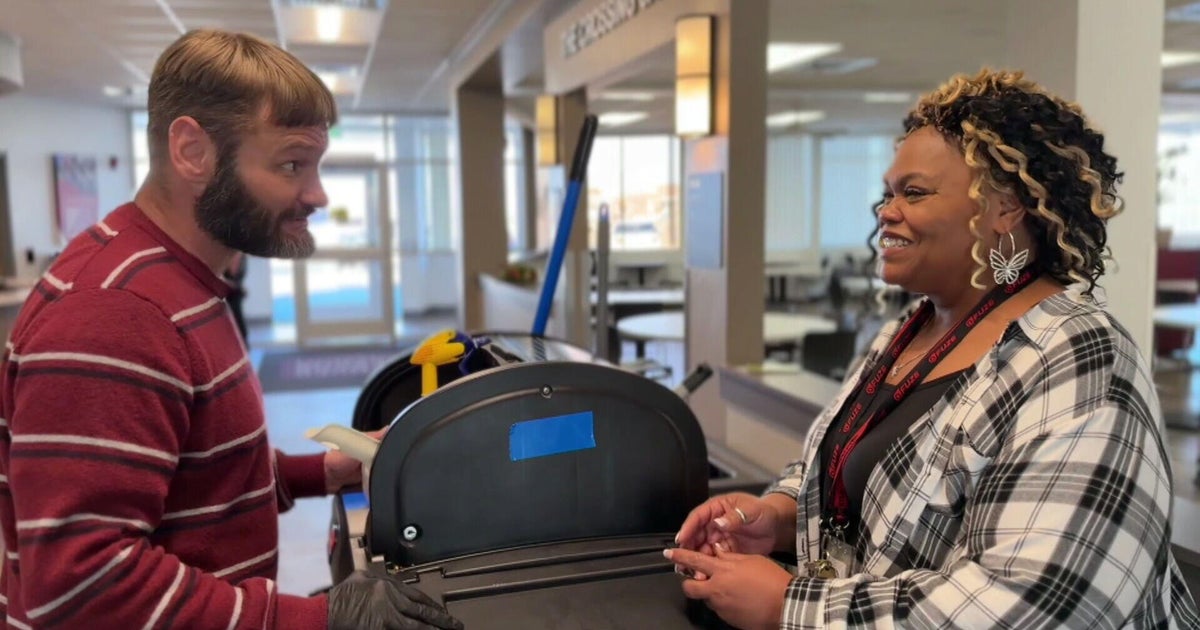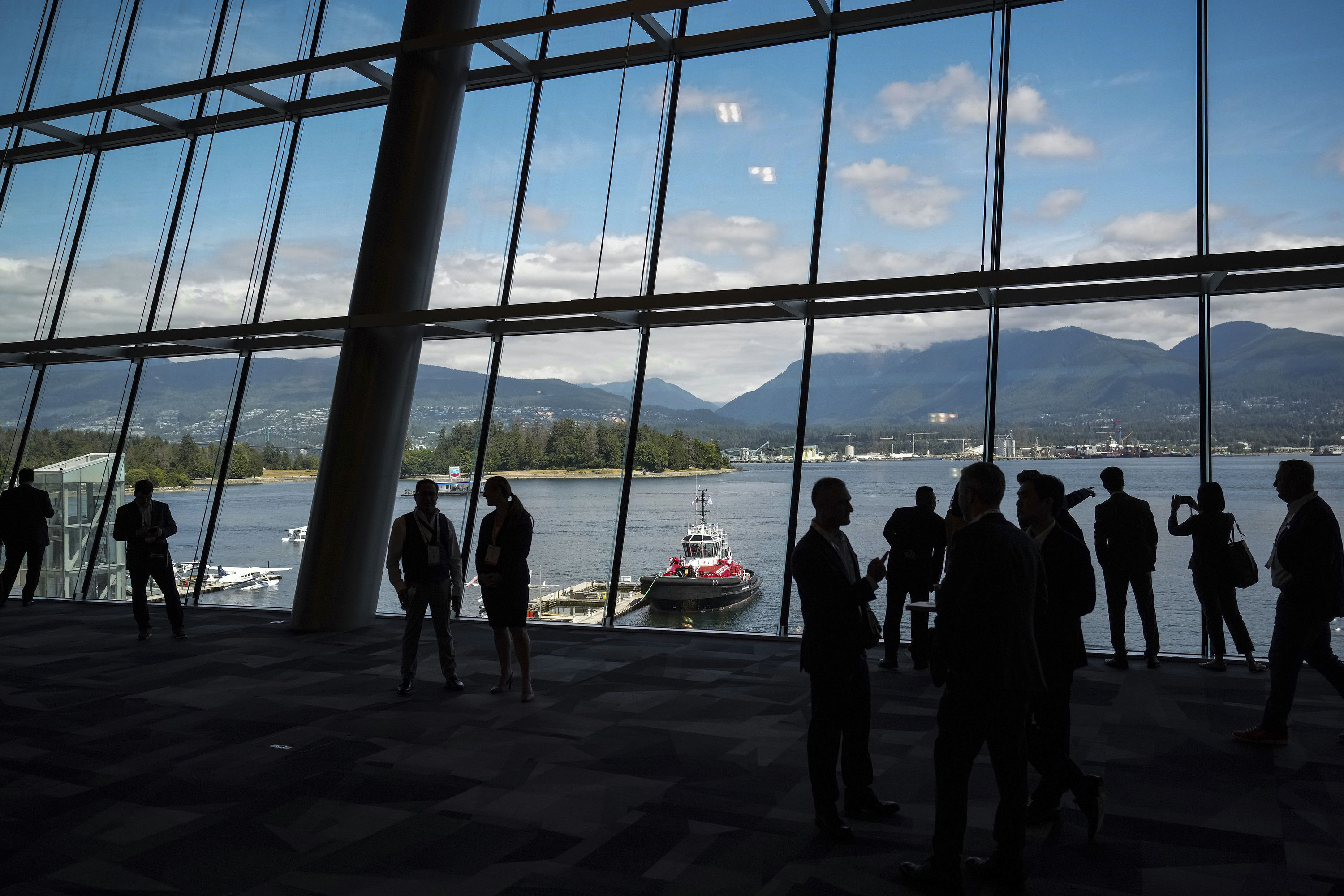The men saving history from ISIS
We have come across an unlikely band of brothers on the battlefield against terrorism. They are men of the cloth, a pair of padres, who go into harm's way to find and protect ancient religious books and manuscripts.
We joined them in a region of Iraq that was once Mesopotamia where human culture and learning really began. It's believed to be the birthplace of mathematics, writing and agriculture and recently, the scene of some of the fiercest battles in the U.S.-backed war against ISIS.
Father Columba: I think it's the graffiti that's most horrifying to me.
Father Columba, a Benedictine monk from Minnesota and Father Najeeb Michaeel, a Dominican friar from Iraq decided to partner up to rescue what old documents they could from places like this monastery, Mar Behnam, in Northern Iraq that goes back to the 4th century. It was occupied and defaced by ISIS.
Father Najeeb Michaeel: They destroy everything.
Leslie Stahl: They seem to wanna destroy everything Christian.
Father Najeeb Michaeel: Exactly – to delete our history. To say that there are no Christians, nothing before Islam. And even here, the statue of Virgin Mary – they destroyed it.
The monastery, according to historians, was sacred to both Christians and Muslims in medieval times. It had amassed a collection of manuscripts dating back to the 12th century.
Father Najeeb Michaeel: In this kind of container...
As ISIS was closing in, the resident monks hid the texts in these barrels which they entombed behind a fake wall.
Leslie Stahl: And ISIS never found it?
Father Najeeb Michaeel: No, because--
Leslie Stahl: For two years?
Father Najeeb Michaeel: Exactly, because the monks more intelligent than ISIS.
When this part of Iraq was liberated last year, those intelligent monks returned, drilled through the two walls, found the barrels – and the precious hand-written books.
Father Columba: So it's the one thing that they couldn't replace, 'cause you could rebuild a building. You can put a new cross up. Those could not be replaced, and those were saved.
There were more than 500, now protected in a house in Erbil, the capital of Kurdistan.
Father Najeeb Michaeel: Very good condition.
Father Columba: Very good condition. Early 5th-century author.
They include Bibles, scientific works and a grammar book filled with random doodles scribbled down centuries ago.
Fathers Columba and Najeeb have been cleaning, restoring and photographing the documents they have rescued from all over Iraq.
In going through them they're unearthing finds like this copy of a 7th-century contract believed to be a mandate by the Prophet Muhammed that says Christians will be protected from their enemies and allowed to practice their religion.
Father Columba: The whole Middle East at one time was characterized by pluralism, different peoples, different languages, different religions coexisting.
Leslie Stahl: You know, it's interesting that there are people who are risking their lives to preserve these documents, they're the very documents that ISIS is risking their lives to destroy. You know, there's a war over these books.
Father Columba: There's a real war.
In that war, ISIS swept across Northern Iraq in 2014, causing Christians and Yazidis to flee in desperate caravans.
When the city of Qaraqosh was attacked by ISIS, 50,000 Christians were driven out in a matter of days -- many on foot, the ill on makeshift stretchers. Before Father Najeeb left on the final night of the siege, he gathered up as many books as he could from his monastery there.
Father Najeeb Michaeel: We have many, many children. And many families with us. And I ask them to carry something with me. So they help me.
Leslie Stahl: Carry the manuscripts?
Father Najeeb Michaeel: Even the little girls and boys ten to 12 years, they carry the heritage and manuscripts from 13th, 14th century. I don't save it alone.
They raced from Qaraqosh to the safety of Kurdistan as ISIS fighters chased after them.
Father Najeeb Michaeel: I saw many hundreds of ISIS flags and cars. And they are ready to attack us and to cut our, our route. And kill us.
Leslie Stahl: Frightening. Totally frightening.
Father Najeeb Michaeel: I feel at that moment is the end of my life. And the end of the life of everyone.
Then it got worse. When they got to the checkpoint, the Kurdish Army, the Peshmerga, wouldn't let them in.
Father Najeeb Michaeel: The Peshmerga try to attack ISIS by gun and by fighting like that and we saw the fire became over our head.
Leslie Stahl: You're right in the middle.
Father Najeeb Michaeel: We are in the middle between both of them. I start to pray in my heart, "Our Father who art in Heaven, forgive us our sin." I start to give the absolution to all the population. To everyone, Christian or no Christian. And at that moment, sure, we heard a voice, many voice, the checkpoint is open. We are very happy and very quickly, we start to escape at that moment to be in the safe side in Kurdistan.
He said it was a miracle, that all those lives were saved but he wasn't able to save all his books. ISIS burned the ones left behind, as we saw when he took us back to his old house in Qaraqosh.
Leslie Stahl: Are you okay father?
Father Najeeb Michaeel: No.
Leslie Stahl: You're not okay
Father Najeeb Michaeel: I'm so sad from inside.
He showed us what ISIS did to the 40,000 books that were in his library.
Leslie Stahl: That's books?
Father Najeeb Michaeel: That's books.
Leslie Stahl: Oh, you can see the pages? And they just torched it—
Father Najeeb Michaeel: This part, yes.
The books he did manage to save are here...
Father Najeeb Michaeel: Here's the Holy of Holies.
The Holy of Holies is a room in a secret location in the Kurdish region of Northern Iraq. It's where Father Najeeb is protecting his most treasured possessions.
Father Najeeb Michaeel: It's a Gospel, the New Testament.
Leslie Stahl: Wow, look at that.
Father Najeeb Michaeel: Palm Sunday. This one when Jesus go to Jerusalem and with a donkey.
Leslie Stahl: This is by hand obviously--
Father Najeeb Michaeel: All is handwritten. And this one--
Leslie Stahl: Look at those colors.
Father Najeeb Michaeel: This with eggs -- yellow.
Father Columba: The egg yolk?
Leslie Stahl: The yellow is made from egg yolks?
FR Father Najeeb Michaeel: Exactly.
Leslie Stahl: And what's the red, do you know?
Father Najeeb Michaeel: Pomegranate
Father Columba: Pomegranate.
Leslie Stahl: And it survived!
Father Najeeb Michaeel: Yeah.
It's just one of the 3,500 texts he saved from ISIS.
Books from the 16th and 17th centuries that were used by missionaries dispatched by the church to spread Roman Catholicism in this region.
Father Najeeb Michaeel: St. Thomas Aquinas.
Some show the ravages of time and war, like this fragment of the New Testament written in about the year 500 and --
Father Najeeb Michaeel: So, this is a parchment from ten, 11-century. It's a parchment with a sheepskin.
Leslie Stahl: What lang-- is that Hebrew?
Father Najeeb Michaeel: This is in-- in Aramaic. Old Aramaic.
Leslie Stahl: Aramaic? That's the language of Jesus?
Father Najeeb Michaeel: It's the language of Jesus Christ and our mother tongue.
Father Columba: And the other thing to remember is that these aren't all religious manuscripts. So some of them are purely history so those are ones that tell us about political events, and kings, and battles, and famines and all of these other things. So it's not simply history of religion, it's history of every aspect of life.
Home base for Father Columba is 6,000 miles from Iraq -- at St. John's Abbey and University in Collegeville, Minnesota, where he spends his days with his fellow monks in prayer and contemplation.
He's also director of this library, the world's largest repository of ancient texts, more than 50 million pages from both Christian and Islamic works, all photographed and archived in an online database.
The collection includes the sacred and the secular, like a 1771 account by a priest telling of a plague that killed 45,000. Father Columba found it in Turkey. And a tax receipt from the Roman Empire in the year 222 for the purchase of military equipment.
Leslie Stahl: So how do these texts and these manuscripts – how do they relate to today? What's the best lesson you've read about?
Father Columba: We can learn about places in our past where people could live together reasonably peacefully for certain periods of time. And then very often what made it impossible was an external intervention so the crusaders come and that makes it very difficult for Christians in the Middle East.
He learned that from this 12th-century text that he found in Aleppo, Syria called "World Chronicle" by Michael the Great about how the crusades triggered a backlash against the local Christians.
Until now, scholars tell us, the history of Christianity in the Middle East has largely been told from a Western perspective. These texts provide historical details that cannot be found anywhere else and, when taken together, will rewrite this history from the point of view of those who actually lived it.
Leslie Stahl: A lot of the places you've gone to are under threat by some radical Islamic group. And you're kinda just following them around.
Father Columba: In a sense where the hotspots are.
On this trip to Iraq – he went hunting for old documents at the University of Mosul, in a section of the city that had been liberated.
Father Columba: So one of our questions is: Can anything possibly have survived?
The library here -- once among the finest in the Middle East -- was reduced to rubble in the battle to retake the city.
Leslie Stahl: It looks like the apocalypse.
Father Columba: It's unbelievable. It's totally devastated.
Leslie Stahl: So what do you think happened here?
Father Columba: It must've been an airstrike. The U.S.-backed coalition forces, as part of the liberation of Mosul.
Leslie Stahl: A bomb?
Father Columba: That may have been what started the fire. It must've been a bomb. It came through the roof. And then you can see it coming through two floors. And then presumably exploding below.
Leslie Stahl: But not ISIS? It was the U.S.-backed forces?
Father Columba: Absolutely. So ISIS had been here, had done their damage, had burned their books, and this kind of destruction of the building that we're looking at would have happened right at the end. Liberation brings a lot of destruction.
The university library used to hold about a million books and a collection of ancient maps and manuscripts.
Father Columba: It's a horrible loss.
In this age of intolerance, there are very few Christians left in Iraq. Many who fled Qaraqosh with Father Najeeb have left the country. Others are here – in a refugee camp in Erbil where religion remains at the center of their lives.
Even as their presence in Iraq continues to fade, what will always remain – thanks to the work of Fathers Columba and Najeeb – is a written record of their history and heritage.
Produced by Richard Bonin and Ayesha Siddiqi.
